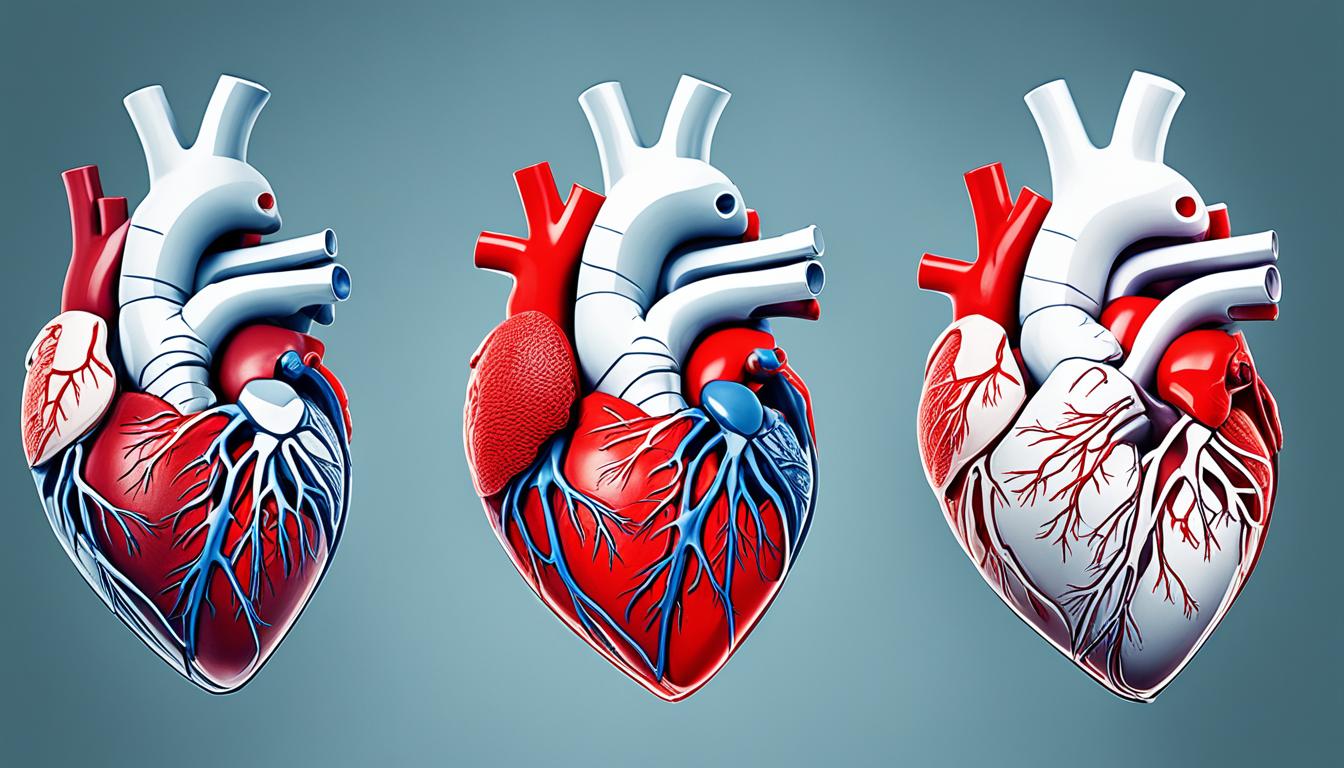Hypertrophic cardiomyopathy thickens the heart walls, making blood pumping harder. This condition is genetic and can enlarge the heart muscle. Signs include fast heartbeat, dizziness, breath shortness, and chest pain.
Many options exist to treat hypertrophic cardiomyopathy. These include medicine, surgery, and the innovative stem cell treatment. Factors that increase the risk are a family history of the disease, high blood pressure, and heavy drinking.
Key Takeaways:
- Hypertrophic cardiomyopathy thickens the heart walls.
- It is a genetic disorder that enlarges the heart muscle.
- Symptoms are quick heartbeat, dizziness, trouble deep breath, and chest pain.
- Options for care involve medicine, surgery, and stem cell therapy.
- Things that make you more likely to get it are family history, high blood pressure, and too much alcohol.
Types of Cardiomyopathy: Dilated, Hypertrophic, Restrictive, and ARVC
Cardiomyopathy is a term for conditions that affect the heart muscle. There are different types, each with unique symptoms and treatments. It’s important to know these for the right diagnosis and treatment.
Dilated Cardiomyopathy
Dilated cardiomyopathy makes the heart chambers thin and stretch. This weakens the heart’s pumping. Symptoms include feeling tired, breathless, leg swelling, and heart rhythm issues.
Hypertrophic Cardiomyopathy
In hypertrophic cardiomyopathy, the heart walls get thick. This makes it harder for the heart to pump blood. It’s an inherited condition. Common signs are fast heartbeats, chest pain, breathlessness, and feeling faint. This is a common genetic heart illness.
Restrictive Cardiomyopathy
Restrictive cardiomyopathy makes the heart muscle stiff and less stretchy. So, the heart can’t fill well. People may feel tired, have swollen belly or legs, and heart rhythm issues.
Arrhythmogenic Right Ventricular Cardiomyopathy (ARVC)
ARVC is a rare kind where fatty or scar tissue replaces heart muscle in the right ventricle. It can cause dangerous heart rhythms. Symptoms include a fast heart, fainting, and breathlessness.
Each cardiomyopathy type needs its own treatment method. The goal is to ease symptoms, boost heart function, and better the patient’s life quality. Treatments can be through drugs, changing lifestyle, devices, surgery, and sometimes, a heart transplant. It’s key that people with cardiomyopathy and their doctors pick the right treatment plan together.
Diagnosis and Treatment of Hypertrophic Cardiomyopathy
Diagnosing hypertrophic cardiomyopathy involves a detailed evaluation. Doctors check the patient’s medical history and do a full body check. They also do tests like an ECG, echocardiogram, cardiac MRI, and genetic testing.
An ECG tracks the heart’s electrical patterns with electrodes on the chest. It can reveal heart rhythm issues linked to hypertrophic cardiomyopathy. An echocardiogram builds heart images using sound waves. It helps measure heart muscle thickness and function. A cardiac MRI provides detailed heart pictures. It checks the condition’s severity. Doctors might advise genetic testing to find specific gene problems, mainly in cases with family history.
Treatment for this condition focuses on easing symptoms and improving the heart’s function. Doctors usually use medicines like beta blockers and calcium channel blockers. These help with chest pain, shortness of breath, and irregular heartbeats.
If symptoms are extreme, surgeons might suggest certain operations. A septal myectomy cuts away part of the thickened heart muscle to aid blood flow. Or an alcohol septal ablation procedure might be done. It shrinks the thick muscle by injecting alcohol into a blood vessel.
For severe cases, pacemakers or cardioverter-defibrillators might be needed. They help keep the heart’s rhythm in check. If the condition is very bad, a heart transplant could be an option.
Stem cell therapy is a new field for treating hypertrophic cardiomyopathy. It uses stem cells to heal damaged parts of the heart. Even though it’s early, this therapy shows hope for the future.
Table: Treatment Options for Hypertrophic Cardiomyopathy
|Treatment Option | Description |
|——————————-|——————————————————————–|
|Medication | Prescribed to control symptoms and improve heart function |
|Surgical Procedures | Septal myectomy or alcohol septal ablation to relieve obstruction |
|Implantable Devices | Pacemakers or cardioverter-defibrillators to regulate heart rhythm |
|Heart Transplantation | Considered in severe cases with refractory symptoms or heart failure|
|Stem Cell Therapy (experimental)| Utilizes stem cells to regenerate damaged heart tissue |
Note: Treatment options depend on the condition’s seriousness and the patient’s health. Talking with a doctor is crucial for the best advice.
Conclusion
Hypertrophic cardiomyopathy is a tough heart condition to deal with. It needs correct diagnosis and the right treatment. Over the years, we’ve seen medicine, surgery, and devices help. Now, stem cell therapy shows promise for the future.
Stem cell research and trials have brought hope. They aim to repair the heart’s damage and stop the disease from getting worse. Thanks to new medical tools and studies, treating hypertrophic cardiomyopathy is getting better. This gives those with the condition newly found hope.

